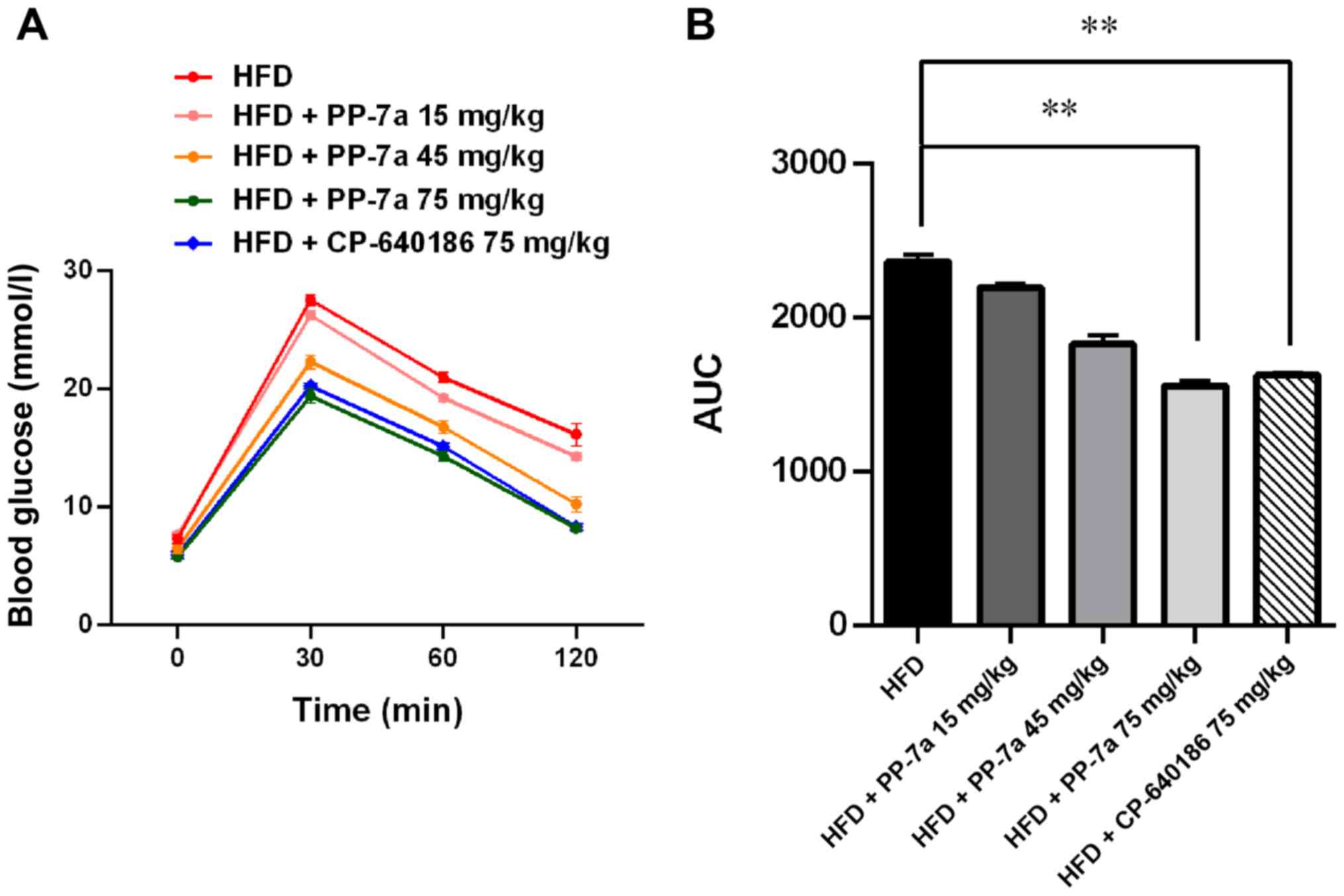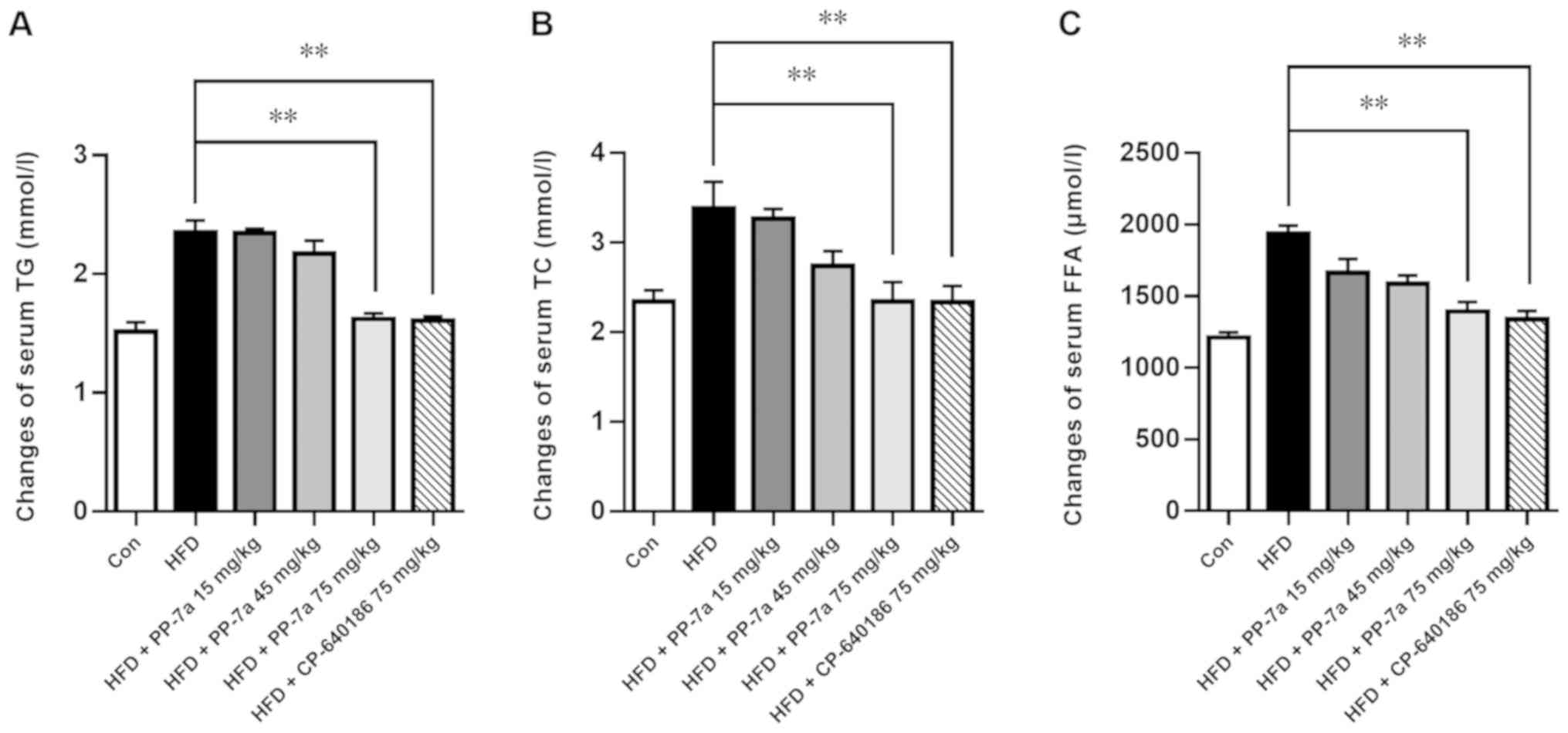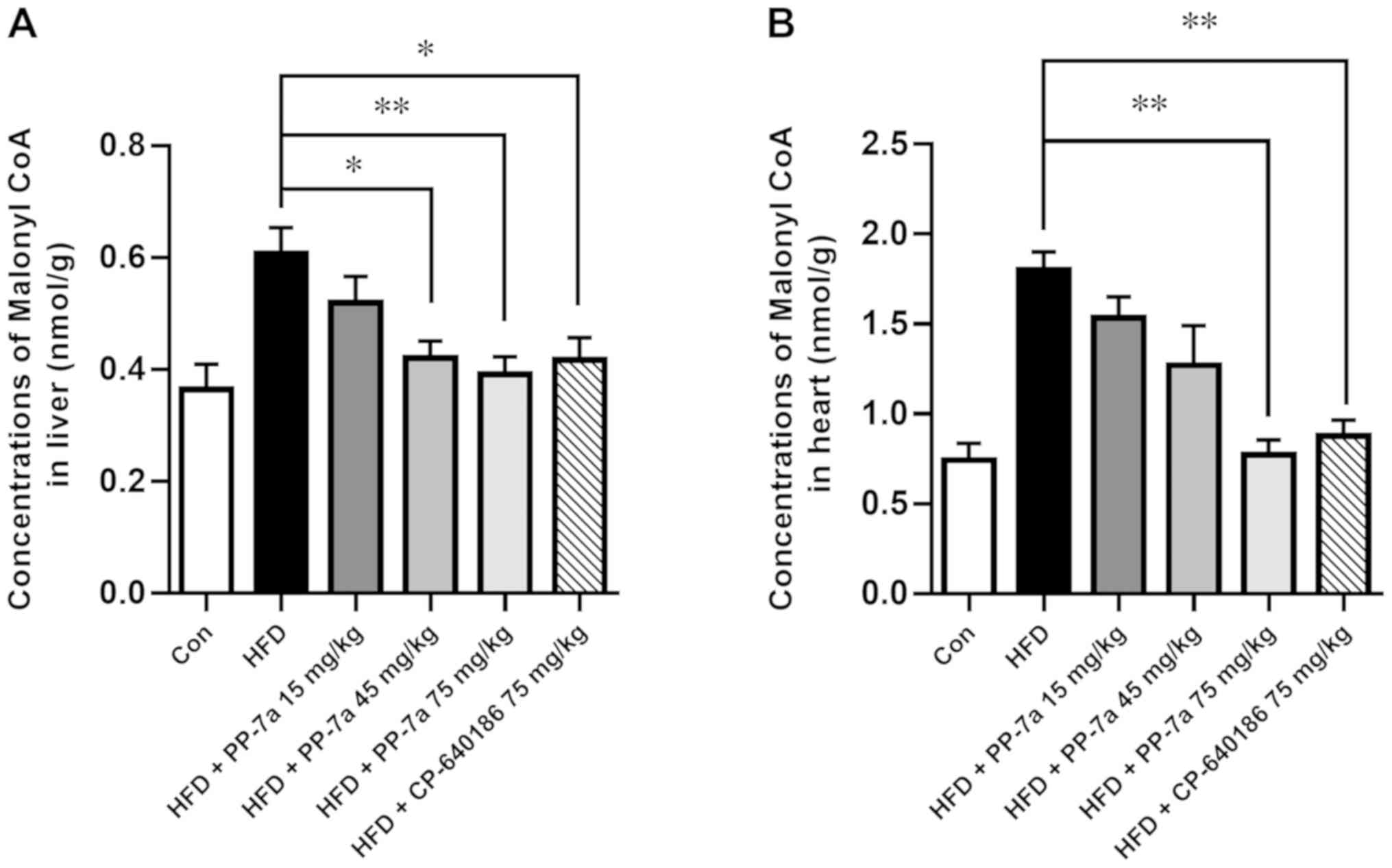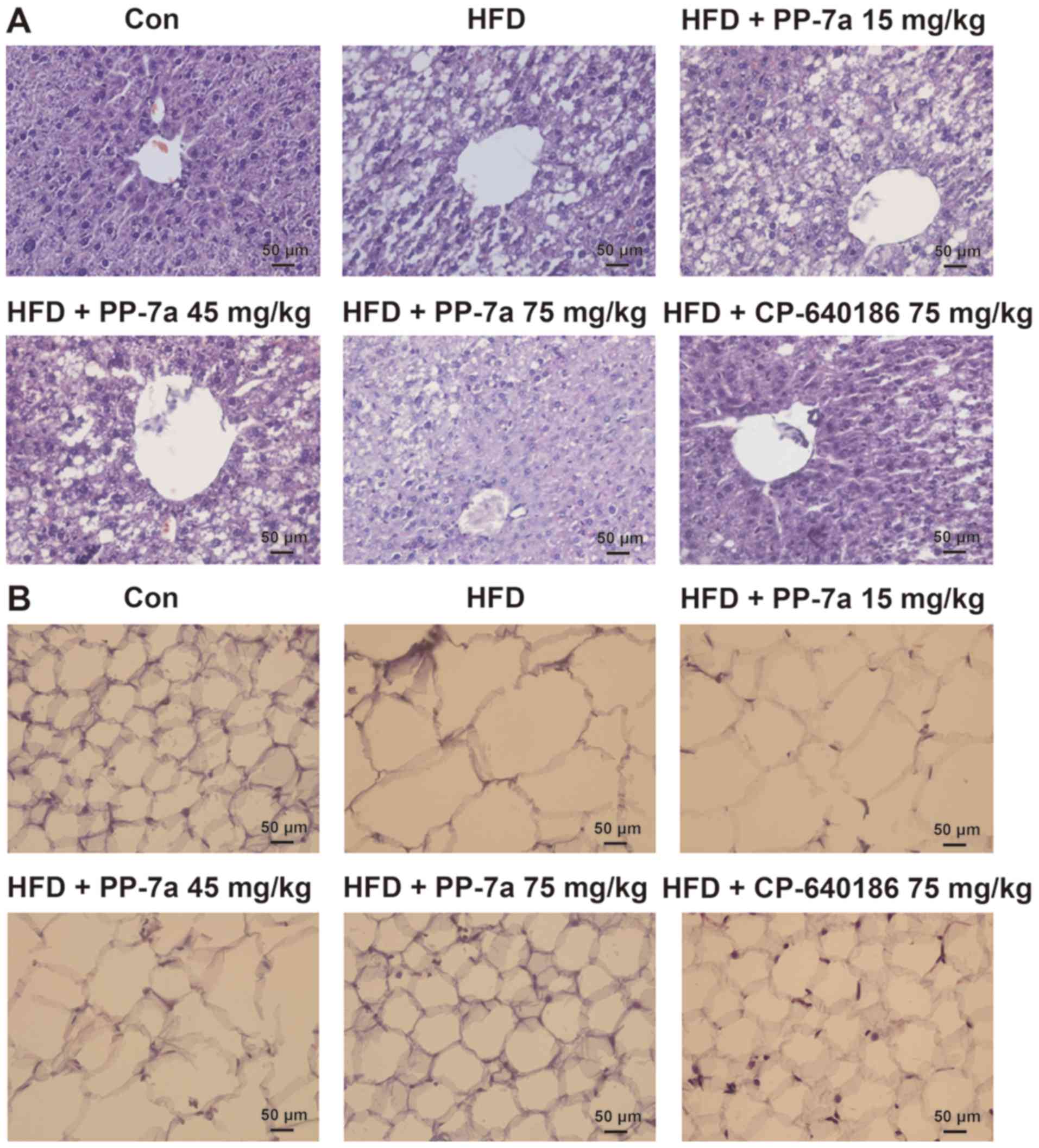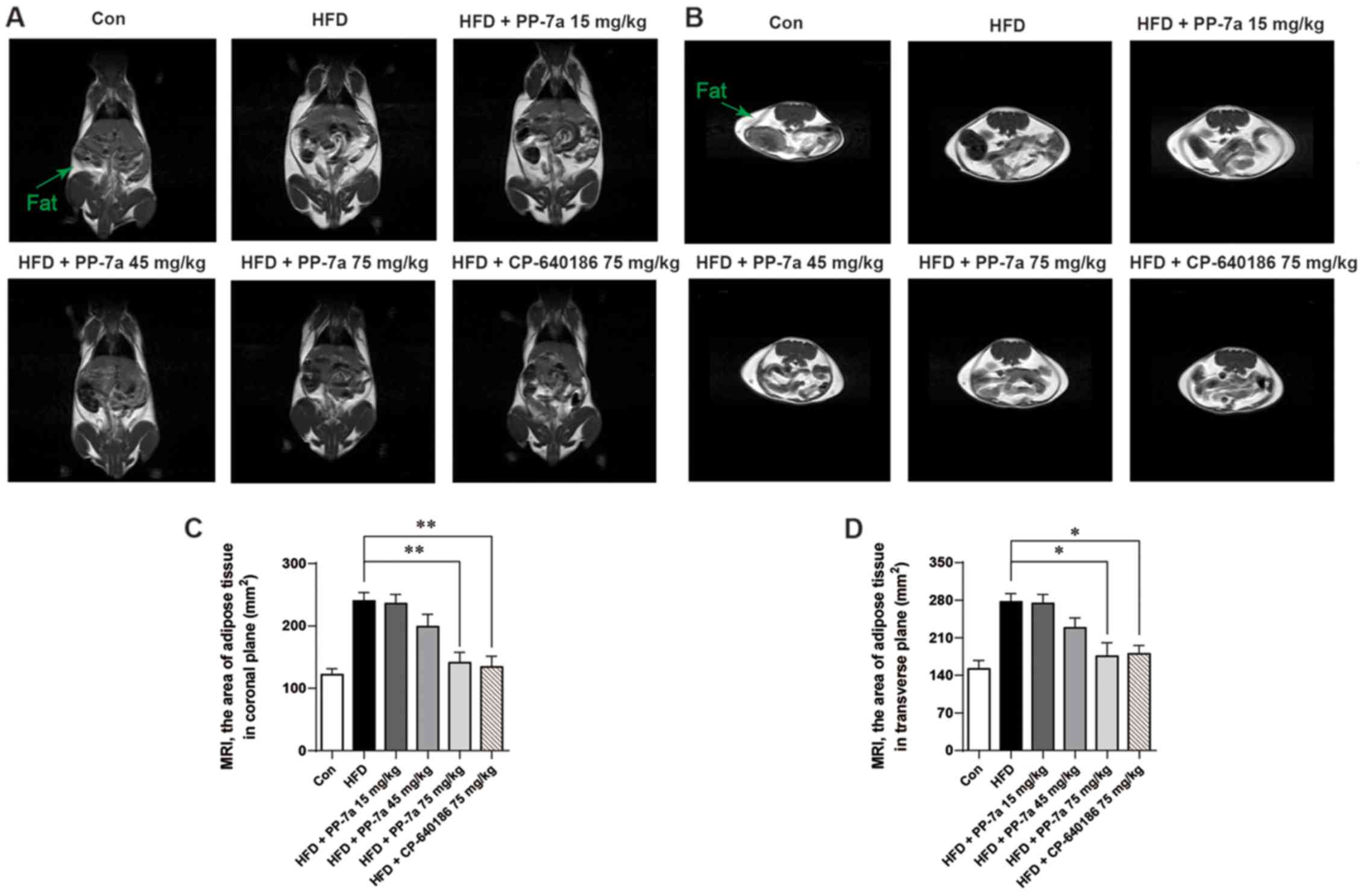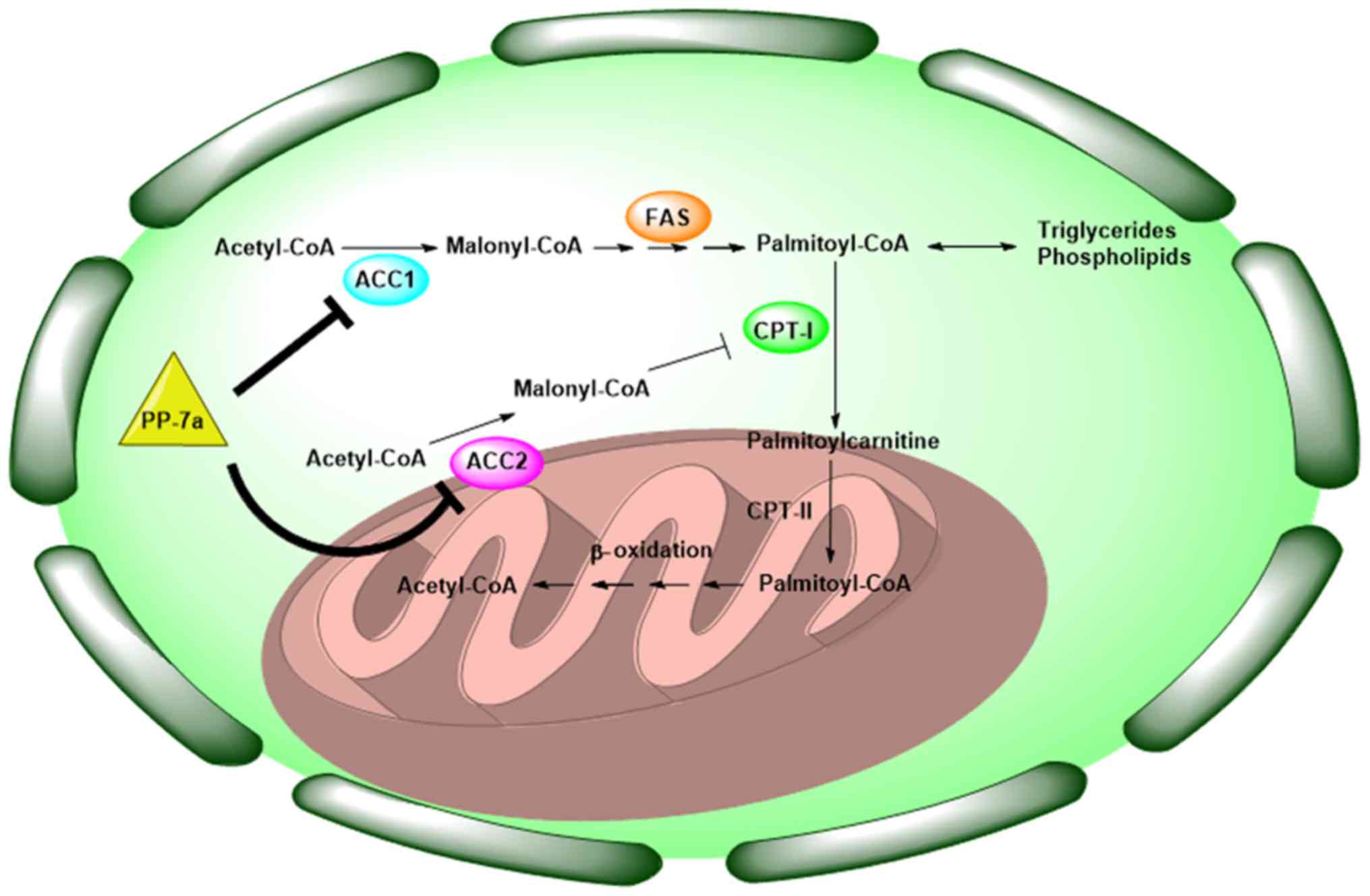|
1
|
Basen-Engquist K and Chang M: Obesity and
cancer risk: Recent review and evidence. Curr Oncol Rep. 13:71–76.
2011.PubMed/NCBI View Article : Google Scholar
|
|
2
|
Gou L, Zhao L, Song W, Wang L, Liu J,
Zhang H, Huang Y, Lau CW, Yao X, Tian XY, et al: Inhibition of
miR-92a suppresses oxidative stress and improves endothelial
function by upregulating heme oxygenase-1 in db/db mice. Antioxid
Redox Signal. 28:358–370. 2018.PubMed/NCBI View Article : Google Scholar
|
|
3
|
Mohammed MS, Sendra S, Lloret J and Bosch
I: Systems and WBANs for controlling obesity. J Healthc Eng.
2018(1564748)2018.PubMed/NCBI View Article : Google Scholar
|
|
4
|
Tong L and Harwood HJ Jr: Acetyl-coenzyme
A carboxylases: Versatile targets for drug discovery. J Cell
Biochem. 99:1476–1488. 2006.PubMed/NCBI View Article : Google Scholar
|
|
5
|
Harriman G, Greenwood J, Bhat S, Huang X,
Wang R, Paul D, Tong L, Saha AK, Westlin WF, Kapeller R and Harwood
HJ Jr: Acetyl-CoA carboxylase inhibition by ND-630 reduces hepatic
steatosis, improves insulin sensitivity, and modulates dyslipidemia
in rats. Proc Natl Acad Sci USA. 113:E1796–E1805. 2016.PubMed/NCBI View Article : Google Scholar
|
|
6
|
Kim CW, Addy C, Kusunoki J, Anderson NN,
Deja S, Fu X, Burgess SC, Li C, Ruddy M, Chakravarthy M, et al:
Acetyl CoA carboxylase inhibition reduces Hepatic steatosis but
elevates plasma triglycerides in mice and humans: A bedside to
bench investigation. Cell Metabol. 26(576)2017.PubMed/NCBI View Article : Google Scholar
|
|
7
|
Wakil SJ and Abu-Elheiga LA: Fatty acid
metabolism: Target for metabolic syndrome. J Lipid Res. 50
(Suppl):S138–S143. 2009.PubMed/NCBI View Article : Google Scholar
|
|
8
|
Harwood HJ Jr: Treating the metabolic
syndrome: Acetyl-CoA carboxylase inhibition. Expert Opin Ther
Targets. 9:267–281. 2005.PubMed/NCBI View Article : Google Scholar
|
|
9
|
Goedeke L, Bates J, Vatner DF, Perry RJ,
Wang T, Ramirez R, Li L, Ellis MW, Zhang D, Wong KE, et al:
Acetyl-CoA carboxylase inhibition reverses NAFLD and hepatic
insulin resistance but promotes hypertriglyceridemia in rodents.
Hepatology. 68:2197–2211. 2018.PubMed/NCBI View Article : Google Scholar
|
|
10
|
Abu-Elheiga L, Brinkley WR, Zhong L,
Chirala SS, Woldegiorgis G and Wakil SJ: The subcellular
localization of acetyl-CoA carboxylase 2. Proc Natl Acad Sci USA.
97:1444–1449. 2000.PubMed/NCBI View Article : Google Scholar
|
|
11
|
Marin-Garcia J and Goldenthal MJ: Fatty
acid metabolism in cardiac failure: Biochemical, genetic and
cellular analysis. Cardiovasc Res. 54:516–527. 2002.PubMed/NCBI View Article : Google Scholar
|
|
12
|
Qu Q, Zeng F, Liu X, Wang QJ and Deng F:
Fatty acid oxidation and carnitine palmitoyltransferase I: Emerging
therapeutic targets in cancer. Cell Death Dis.
7(e2226)2016.PubMed/NCBI View Article : Google Scholar
|
|
13
|
Ussher JR and Lopaschuk GD: The malonyl
CoA axis as a potential target for treating ischaemic heart
disease. Cardiovasc Res. 79:259–268. 2008.PubMed/NCBI View Article : Google Scholar
|
|
14
|
Baig NA, Herrine SK and Rubin R: Liver
disease and diabetes mellitus. Clin Lab Med. 21:193–207.
2001.PubMed/NCBI
|
|
15
|
Abu-Elheiga L, Matzuk MM, Abo-Hashema KA
and Wakil SJ: Continuous fatty acid oxidation and reduced fat
storage in mice lacking acetyl-CoA carboxylase 2. Science.
291:2613–2616. 2001.PubMed/NCBI View Article : Google Scholar
|
|
16
|
Glund S, Schoelch C, Thomas L, Niessen HG,
Stiller D, Roth GJ and Neubauer H: Inhibition of acetyl-CoA
carboxylase 2 enhances skeletal muscle fatty acid oxidation and
improves whole-body glucose homeostasis in db/db mice.
Diabetologia. 55:2044–2053. 2012.PubMed/NCBI View Article : Google Scholar
|
|
17
|
Huang T, Sun J, Wang Q, Gao J and Liu Y:
Synthesis, biological evaluation and molecular docking studies of
piperidinylpiperidines and spirochromanones Possessing quinoline
moieties as Acetyl-CoA carboxylase inhibitors. Molecules.
20:16221–16234. 2015.PubMed/NCBI View Article : Google Scholar
|
|
18
|
Huang TH, Sun J, Xu M and Liu Y:
Biological evaluation studies of Acetyl-Coa carboxylase inhibitor
in high fat diet induced obese mice. Basic Clin Pharmacol.
119:44–45. 2016.
|
|
19
|
Liu Y, Fu X, Lan N, Li S, Zhang J, Wang S,
Li C, Shang Y, Huang T and Zhang L: Luteolin protects against high
fat diet-induced cognitive deficits in obesity mice. Behav Brain
Res. 267:178–188. 2014.PubMed/NCBI View Article : Google Scholar
|
|
20
|
Harwood HJ Jr, Petras SF, Shelly LD,
Zaccaro LM, Perry DA, Makowski MR, Hargrove DM, Martin KA, Tracey
WR, Chapman JG, et al: Isozyme-nonselective N-substituted
bipiperidylcarboxamide acetyl-CoA carboxylase inhibitors reduce
tissue malonyl-CoA concentrations, inhibit fatty acid synthesis,
and increase fatty acid oxidation in cultured cells and in
experimental animals. J Biol Chem. 278:37099–37111. 2003.PubMed/NCBI View Article : Google Scholar
|
|
21
|
Matsushita H, Johnston MV, Lange MS and
Wilson MA: Protective effect of erythropoietin in neonatal hypoxic
ischemia in mice. Neuroreport. 14:1757–1761. 2003.PubMed/NCBI View Article : Google Scholar
|
|
22
|
Chen B, Ma Y, Xue X, Wei J, Hu G and Lin
Y: Tetramethylpyrazine reduces inflammation in the livers of mice
fed a high fat diet. Mol Med Rep. 19:2561–2568. 2019.PubMed/NCBI View Article : Google Scholar
|
|
23
|
Feng Y, Yu YH, Wang ST, Ren J, Camer D,
Hua YZ, Zhang Q, Huang J, Xue DL, Zhang XF, et al: Chlorogenic acid
protects D-galactose-induced liver and kidney injury via
antioxidation and anti-inflammation effects in mice. Pharm Biol.
54:1027–1034. 2016.PubMed/NCBI View Article : Google Scholar
|
|
24
|
Lu JC, Jing J, Yao Q, Fan K, Wang GH, Feng
RX, Liang YJ, Chen L, Ge YF and Yao B: Relationship between lipids
levels of serum and seminal plasma and semen parameters in 631
Chinese subfertile men. PLoS One. 11(e0146304)2016.PubMed/NCBI View Article : Google Scholar
|
|
25
|
Cuthbert KD and Dyck JR: Malonyl-CoA
decarboxylase is a major regulator of myocardial fatty acid
oxidation. Curr Hypertens Rep. 7:407–411. 2005.PubMed/NCBI View Article : Google Scholar
|
|
26
|
Awan MM and Saggerson ED: Malonyl-CoA
metabolism in cardiac myocytes and its relevance to the control of
fatty acid oxidation. Biochem J. 295:61–66. 1993.PubMed/NCBI View Article : Google Scholar
|
|
27
|
Munday MR: Regulation of mammalian
acetyl-CoA carboxylase. Biochem Soc Trans. 30:1059–1064.
2002.PubMed/NCBI View Article : Google Scholar
|
|
28
|
Saddik M, Gamble J, Witters LA and
Lopaschuk GD: Acetyl-CoA carboxylase regulation of fatty acid
oxidation in the heart. J Biol Chem. 268:25836–25845.
1993.PubMed/NCBI
|
|
29
|
Eleftheriadis T, Pissas G, Sounidaki M,
Tsogka K, Antoniadis N, Antoniadi G, Liakopoulos V and Stefanidis
I: Indoleamine 2,3-dioxygenase, by degrading L-tryptophan, enhances
carnitine palmitoyltransferase I activity and fatty acid oxidation,
and exerts fatty acid-dependent effects in human alloreactive CD4+
T-cells. Int J Mol Med. 38:1605–1613. 2016.PubMed/NCBI View Article : Google Scholar
|
|
30
|
Choi CS, Savage DB, Abu-Elheiga L, Liu ZX,
Kim S, Kulkarni A, Distefano A, Hwang YJ, Reznick RM, Codella R, et
al: Continuous fat oxidation in acetyl-CoA carboxylase 2 knockout
mice increases total energy expenditure, reduces fat mass, and
improves insulin sensitivity. Proc Natl Acad Sci USA.
104:16480–16485. 2007.PubMed/NCBI View Article : Google Scholar
|
|
31
|
Strable MS and Ntambi JM: Genetic control
of de novo lipogenesis: Role in diet-induced obesity. Crit Rev
Biochem Mol Biol. 45:199–214. 2010.PubMed/NCBI View Article : Google Scholar
|
|
32
|
Golay A and Bobbioni E: The role of
dietary fat in obesity. Int J Obes Relat Metab Disord. 21 (Suppl
3):S2–S11. 1997.PubMed/NCBI
|
|
33
|
Heydemann A: An overview of murine high
fat diet as a model for type 2 diabetes mellitus. J Diabetes Res.
2016(2902351)2016.PubMed/NCBI View Article : Google Scholar
|
|
34
|
Hariri N and Thibault L: High-fat
diet-induced obesity in animal models. Nutri Res Rev. 23:270–299.
2010.PubMed/NCBI View Article : Google Scholar
|
|
35
|
Ronnett GV, Kleman AM, Kim EK, Landree LE
and Tu Y: Fatty acid metabolism, the central nervous system, and
feeding. Obesity (Silver Spring). 14 (Suppl 5):S201–S207.
2006.PubMed/NCBI View Article : Google Scholar
|
|
36
|
Brownsey RW, Boone AN, Elliott JE, Kulpa
JE and Lee WM: Regulation of acetyl-CoA carboxylase. Biochem Soc
Trans. 34:223–227. 2006.PubMed/NCBI View Article : Google Scholar
|
|
37
|
Folmes CD and Lopaschuk GD: Role of
malonyl-CoA in heart disease and the hypothalamic control of
obesity. Cardiovasc Res. 73:278–287. 2007.PubMed/NCBI View Article : Google Scholar
|
|
38
|
Olson DP, Pulinilkunnil T, Cline GW,
Shulman GI and Lowell BB: Gene knockout of Acc2 has little effect
on body weight, fat mass, or food intake. Proc Natl Acad Sci USA.
107:7598–7603. 2010.PubMed/NCBI View Article : Google Scholar
|
|
39
|
Hoehn KL, Turner N, Swarbrick MM, Wilks D,
Preston E, Phua Y, Joshi H, Furler SM, Larance M, Hegarty BD, et
al: Acute or chronic upregulation of mitochondrial fatty acid
oxidation has no net effect on whole-body energy expenditure or
adiposity. Cell Metab. 11:70–76. 2010.PubMed/NCBI View Article : Google Scholar
|
|
40
|
Akiyama T, Tachibana I, Shirohara H,
Watanabe N and Otsuki M: High-fat hypercaloric diet induces
obesity, glucose intolerance and hyperlipidemia in normal adult
male Wistar rat. Diabetes Res Clin Pract. 31:27–35. 1996.PubMed/NCBI View Article : Google Scholar
|
|
41
|
Dominiczak MH: Obesity, glucose
intolerance and diabetes and their links to cardiovascular disease
Implications for laboratory medicine. Clin Chem Lab Med.
41:1266–1278. 2003.PubMed/NCBI View Article : Google Scholar
|
|
42
|
Fernandez ML and West KL: Mechanisms by
which dietary fatty acids modulate plasma lipids. J Nutr.
135:2075–2078. 2005.PubMed/NCBI View Article : Google Scholar
|
|
43
|
Stefan N, Kantartzis K and Haring HU:
Causes and metabolic consequences of Fatty liver. Endocr Rev.
29:939–960. 2008.PubMed/NCBI View Article : Google Scholar
|
|
44
|
Eleftheriadis T, Pissas G, Liakopoulos V
and Stefanidis I: IDO decreases glycolysis and glutaminolysis by
activating GCN2K, while it increases fatty acid oxidation by
activating AhR, thus preserving CD4+ T-cell survival and
proliferation. Int J Mol Med. 42:557–568. 2018.PubMed/NCBI View Article : Google Scholar
|
|
45
|
Eleftheriadis T, Pissas G, Antoniadi G,
Liakopoulos V and Stefanidis I: Indoleamine 2,3-dioxygenase
depletes tryptophan, activates general control non-derepressible 2
kinase and down-regulates key enzymes involved in fatty acid
synthesis in primary human CD4+ T cells. Immunology. 146:292–300.
2015.PubMed/NCBI View Article : Google Scholar
|
|
46
|
Byersdorfer CA: The role of Fatty Acid
oxidation in the metabolic reprograming of activated t-cells. Front
Immunol. 5(641)2014.PubMed/NCBI View Article : Google Scholar
|
|
47
|
Lochner M, Berod L and Sparwasser T: Fatty
acid metabolism in the regulation of T cell function. Trends
Immunol. 36:81–91. 2015.PubMed/NCBI View Article : Google Scholar
|
|
48
|
Eleftheriadis T, Pissas G, Sounidaki M,
Antoniadi G, Rountas C, Liakopoulos V and Stefanidis L: Tryptophan
depletion under conditions that imitate insulin resistance enhances
fatty acid oxidation and induces endothelial dysfunction through
reactive oxygen species-dependent and independent pathways. Mol
Cell Biochem. 428:41–56. 2017.PubMed/NCBI View Article : Google Scholar
|
|
49
|
Ghosh A, Gao L, Thakur A, Siu PM and Lai
CWK: Role of free fatty acids in endothelial dysfunction. J Biomed
Sci. 24(50)2017.PubMed/NCBI View Article : Google Scholar
|
|
50
|
de Jongh RT, Serné EH, Ijzerman RG, de
Vries G and Stehouwer CD: Free fatty acid levels modulate
microvascular function: Relevance for obesity-associated insulin
resistance, hypertension, and microangiopathy. Diabetes.
53:2873–2882. 2004.PubMed/NCBI View Article : Google Scholar
|
|
51
|
I S Sobczak A, A Blindauer C and J Stewart
A: Changes in plasma free fatty acids associated with type-2
diabetes. Nutrients. 11(E2022)2019.PubMed/NCBI View Article : Google Scholar
|
















